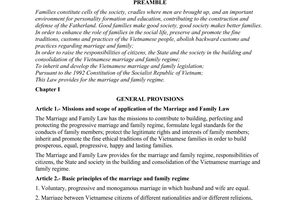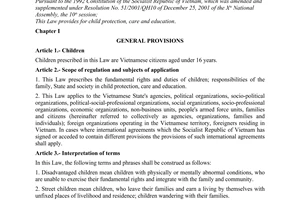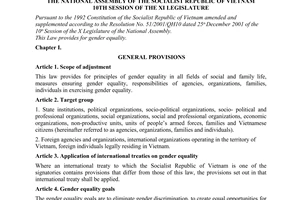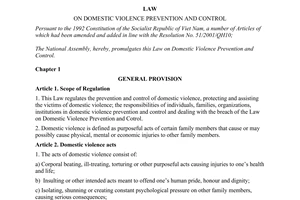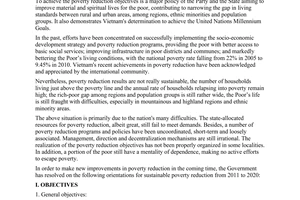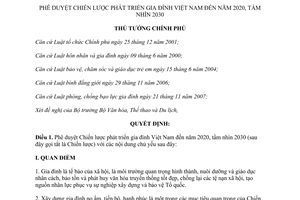Nội dung toàn văn Decision No. 629/QD-TTg approving the Vietnam Family development strategy
|
THE PRIME
MINISTER |
THE
SOCIALIST REPUBLIC OF VIETNAM |
|
No. 629/QD-TTg |
Hanoi, May 29, 2012 |
DECISION
APPROVING THE VIETNAM FAMILY DEVELOPMENT STRATEGY THROUGH 2020, WITH A 2030 VISION
THE PRIME MINISTER
Pursuant to the December 25, 2001 Law on Organization of the Government;
Pursuant to the June 9, 2000 Law on Marriage and Family; Pursuant to the June 15, 2004 Law on Child Protection, Care and Education;
Pursuant to the November 29, 2006 Law on Gender Equality;
Pursuant to the November 21, 2007 Law on Domestic Violence Prevention and Control;
At the proposal of the Minister of Culture, Tourism and Sports,
DECIDES:
Article 1. To approve the Vietnam family development strategy through 2020, with a 2030 vision (below referred to as the strategy), with the following principal contents:
I. VIEWPOINTS
1. Families constitute cells of the society and each family is an important environment for personality formation, development and education, preservation and promotion of fine cultural traditions, fighting against social vices and creation of human resources for national construction and defense.
2. Building prosperous, progressive and happy families is one of important objectives of the 2011-2020 socio-economic development strategy and a responsibility of every family in the period of accelerated national industrialization and modernization.
3. To prioritize and create conditions for families in rural and mountainous areas and areas facing difficulties and extreme difficulties to raise their incomes and improve their lives.
II. OBJECTIVES AND TARGETS
1. General objectives:
To build prosperous, progressive and happy Vietnamese families, which are the loving homes of everyone and healthy cells of the society.
2. Specific objectives:
a/ Objectives 1: To improve awareness about the role, position and responsibility of each family and community in the observance of lines, policies and laws on marriage and family, gender equality, domestic violence prevention and control and prevention of social vices from penetrating into families.
- Target 1: By 2015 and 2020 respectively, 90% and at least 95% of households will be informed about and commit to strictly complying with lines, policies and laws on marriage and family, gender equality, domestic violence prevention and control and prevention of social vices from penetrating into families;
- Target 2: By 2015 and 2020 respectively, 90% and 95% of young people will be provided with basic knowledge about family and domestic violence prevention and control before they get marriage;
- Target 3: The number of households involved in domestic violence will annually reduce by 10-15% on average;
- Target 4: The number of households with members involved in social vices will annually reduce by 10-15% on average;
- Target 5: The number of households with members involved in underage marriages will annually reduce by 15% (or 10% in areas facing difficult or extremely difficult conditions) on average.
b/ Objective 2: To inherit and promote fine traditional values of the Vietnamese family; to selectively absorb progressive family values in developed societies; to fully discharge rights and responsibilities toward family members, especially children, the elderly, pregnant women and women raising small children.
- Target 1: By 2015 and 2020 respectively, at least 80% and 85% of households will reach the cultured-family standard (in areas facing difficult and extremely difficult conditions, these figures will be 70% and 75%);
- Target 2: By 2015 and 2020 respectively, 85% and 95% of households will devote time to looking after and educating children and create conditions for their comprehensive development in all physical, intellectual, moral and spiritual aspects, regardless of their gender;
- Target 3: By 2015 and 2020 respectively, 85% and 95% of households will take proper care of their elderly members, pregnant women and women raising small children;
- Target 4: By 2015 and 2020 respectively, 95% and at least 98% of households with members in the reproductive age group will be informed about and comply with population and family planning policies and will not get gender-based abortions.
c/ Objective 3: To improve families’ capacity for economic development and response to natural disasters and economic crisis; to create jobs, increase incomes and welfare benefits, particularly for social policy beneficiary households, poor households and households living just above the poverty line as prescribed.
- Target 1: By 2015 and 2020 respectively, 90% and at least 95% of households will be informed about policies and laws on social welfare benefits for social policy beneficiary and poor families.
- Target 2: By 2015 and 2020 respectively, 90% and at least 95% of poor households and households living just above the poverty line will be provided with knowledge and skills to improve their economic situation and respond to natural disasters and economic crisis;
- Target 3: The number of families and family members having access to medical, cultural and educational services and family and family member support services will annually increase by 10%.
III. MAJOR SOLUTIONS
1. Leadership, organization and management:
a/ To increase the leadership and direction of Party committees and administrations of all levels over family work which constitutes an important content of their regular work plans and agendas. To integrate family building and development targets into national and local socio- economic development targets;
b/ To enhance the responsibility for management and administration of family work and for the strategy implementation. Leaders of state management agencies in charge of family work shall uphold their responsibilities in directing, managing and organizing family work. The implementation results and effectiveness of family-related objectives and tasks will serve as an important criterion for evaluating the performance of state management agencies in charge of family work at all levels as well as their heads;
c/ To consolidate, train and build capacity for family workers at all levels to be capable of managing and organizing family work;
d/ To raise and effectively use financial resources for family work; to use sate budget funds for family work according to the current state budget decentralization; to prioritize resources for rural areas, poor areas, mountainous areas where backward traditions still exist, and ethnic minority areas;
e/ To integrate and combine the implementation of this strategy with other relevant strategies and plans, assuring their synchronicity and consistency and contributing to raising the implementation effectiveness of national socio-economic development objectives;
f/ To increase inspection of the implementation of family-related laws, policies, tasks and jobs so as to protect the rights and legitimate interests of families and ask them to fulfill their obligations, and strictly handle illegal acts related to family.
2. Communication and social mobilization:
a/ To enhance communication work so as to improve the awareness of all authorities, sectors, families and communities about the position and role of families in the national construction and defense as well as national industrialization and modernization; the Party’s lines and policies and the State’s laws on families; rights, responsibilities and obligations of families, agencies and family-related public employees, aiming to assure and accelerate the implementation of the Party’s lines and policies and the State’s laws on family;
b/ To renovate the content and diversify the forms of communication about family building and domestic violence prevention and control, attaching importance to conveying messages through the mass media and communication targeted at men;
c/ To actively promote cases of good persons and deeds and criticism against wrongful practices in the building of prosperous, progressive and happy Vietnamese families and negative practices affecting family life, and give warnings about threats and consequences of gender imbalance at birth;
d/ To prevent bad information and cultural products which affect families.
3. Education and provision of family building knowledge:
a/ To accelerate education to provide family members with information on family-related lines, policies and laws; life skills (parenting skills, skills for improving the quality of relations among family members and between families and communities and for building families into a safe environment for children); responsibilities of men for doing housework and assuring women’s rights in families; responsibilities for adopting a civilized lifestyle, complying with grassroots democracy regulations and building friendly neighborhood to help, urge and encourage one another to properly implement the Party’s and State’s lines, policies and laws, inheriting and promoting fine traditional values of each family and family line; absorbing progressive family values in developed societies; and giving warnings about the threats and consequences of gender imbalance at birth;
b/ To integrate knowledge on building prosperous, progressive and happy families and domestic violence prevention and control into education and training programs in conformity with the requirements of each education area and level.
4. Further formulating and implementing the Party’s lines and policies and the State’s laws on family and family work:
a/ To accelerate the organization, direction, management and implementation of family-related lines and policies, assuring that families will have access to and fully enjoy their entitlements under the Party’s and State’s policies and regulations, properly discharge their responsibilities in building prosperous, progressive and happy families and proactively contribute to the national construction and development;
b/ To review the implementation of the Party’s and State’s current documents on family and family work and, on that basis, further perfect the system of policies and laws on family and family work and create a foundation for assuring, acting on, supporting and boosting the building of prosperous, progressive and happy Vietnamese families;
c/ To review the practical implementation of the Party’s lines and policies on family and family work and, on that basis, propose the Party Central Committee to promptly supplement and perfect these lines and policies;
d/ To review the practical implementation of legal documents on family and family work, especially the Law on Marriage and Family, the Law on Domestic Violence Prevention and Control and the Law on Gender Equality, and, on that basis, study and propose amendments and supplements to legal documents which reveal many problems or shortcomings in the implementation.
5. Implementing social security policies and programs:
a/ To enhance responsibilities of Party committees, administrations and associations at all levels in creating conditions for and supporting families, especially ethnic minority families and families in deep-lying, remote and difficulty-hit areas, to develop economy and improve their living standards;
b/ To effectively implement the national target program on sustainable poverty reduction and the national target program on employment and vocational training for the 2012-2015 period and subsequent years; to accelerate the implementation of the Government’s Resolution No. 80/NQ- CP of May 19, 2011, on orientations for sustainable poverty reduction from 2011 to 2020;
c/ To generally review policies so as to adjust and expand the scope of regular social assistance for disadvantaged people, giving priority to children of poor households in mountainous and ethnic minority areas; to complete mechanisms and policies on and modes of rendering urgent relief to households facing risks, natural disasters, etc. aiming to raise the effectiveness of these activities, thus helping these households promptly overcome difficulties and stabilize their lives;
d/ To assure households’ access to minimum social services on education, health, housing, clean water and information. To prioritize ethnic minority families and families in poor districts and communes in mountainous, deep-lying and remote areas;
e/ To formulate and implement priority policies for enterprises and investors directly implementing programs and projects on employment for poor households, households living just above the poverty line and households affected by the conversion of agricultural land for urbanization and industrialization.
6. Building family service networks:
a/ To consolidate family service networks. To build service networks in conformity with realities in each region and locality and actual demands of each beneficiary group;
b/ To improve the quality of family services. To review the current situation of and further inspect the provision of these services; to take necessary managerial measures and acts to improve the quality and promote the effectiveness of services;
c/ To develop and improve quality of services which enable families to access and participate in production activities, develop economy, improve quality of life, practice gender equality in the family, support domestic violence victims and contribute to improving labor and production effectiveness and building prosperous, progressive and happy families.
7. Accelerating socialization of family work:
a/ To uphold the sense of initiative and responsibility of each sector in performing family-related tasks, supporting the building and development of families and achieving family-related targets under the responsibilities of sectors, associations and localities;
b/ To mobilize local communities, social organizations, family lines and individuals to support or create conditions for families to raise their awareness about, and have more opportunities and conditions for participating in, the building of prosperous, progressive and happy families;
c/ To promote investment from domestic and foreign organizations and individuals to support families in economic development and improvement of quality of life in conformity with local development planning, requirements and characteristics and laws.
8. To accelerate bilateral and multilateral cooperation with foreign countries and international organizations, prioritizing the study, exchange of experience, and training in policymaking, management, techniques and technology transfer; communication, education and provision of high- quality services; and support for agencies to raise their organization, management and enforcement capacity and for families to develop economy and improve quality of life.
9. To implement of the national action program on domestic violence prevention and control through 2020 after it is approved so as to support ministries, sectors and localities to deal with key issues of family work.
10. To build a database on family and domestic violence prevention and control:
a/ To review and evaluate family-related indicators. To raise the quality of the collection and processing of family-related information and data on the basis of applying information technology and perfecting the system of indicators;
b/ To build a database on family and domestic violence prevention and control serving the study and making of policies in the field of family and domestic violence prevention and control. To develop a set of family-related indicators and a set of indicators for monitoring and evaluating the implementation of the Law on Marriage and Family and the Law on Domestic Violence Prevention and control.
IV. SCHEMES UNDER THE STRATEGY
1. Scheme on consolidation, training and capacity building for family workers at all levels through 2020.
2. Scheme on communication about family building and domestic violence prevention and control on the mass media through 2020.
3. Scheme on education for behavior change in family building and domestic violence prevention and control through 2020.
4. Scheme on raising the quality of family relations and supporting the building of happy and sustainable families through 2020.
5. Scheme on social security work for the 2012-2020 period.
6. Scheme on building a network of family and family member support services through 2020.
7. Scheme on building a database on family and domestic violence prevention and control through 2020.
V. FUNDS
1. Funds for the strategy shall be incorporated in the annual budget expenditure estimates of relevant ministries, sectors, associations, agencies and localities according to the current state budget decentralization.
2. In addition to state budget sources, related ministries, sectors, associations, agencies and localities shall take the initiative in mobilizing financial assistance from domestic and overseas organizations and individuals according to law.
VI. IMPLEMENTATION PHASES
1. Phase I (from 2012 to 2015):
- To improve the effect of the state management of family work.
- To increase communication and education activities aiming to improve awareness about family, family building and domestic violence prevention and control.
- To build and apply some typical family models. To build a database on family and domestic violence prevention and control; to build a set of family-related indicators and a set of indicators for monitoring and evaluating the implementation of the Law on Marriage and Family and Law on Domestic Violence Prevention and control.
- To carry out family support activities (economic support, development of family service networks).
- To conduct preliminary review and mid-term evaluation of the strategy implementation.
2. Phase II (from 2016 to 2020):
- On the basis of the preliminary review and mid-tem evaluation of the strategy implementation in phase I, to adjust policies as appropriate and implement comprehensive solutions for achieving the strategy’s objectives.
To concentrate resources on activities which face difficulties during phase I.
- To widely expand good models and continue developing new models of family and domestic violence prevention and control.
- To effectively exploit and use the database on family and domestic violence prevention and control serving policymaking activities.
- To further share information, experience, good initiatives and effective models of family and domestic violence prevention and control.
- To conduct the final review and evaluation of the strategy implementation.
VII. 2030 VISION
The integration, industrialization and modernization process will strongly affect and bring profound changes to families in many aspects. On the one hand, this process will create favorable conditions and opportunities for families to access knowledge and fine values of other nations and cultures
as well as skills for organizing their lives in a modern society. On the other hand, it will pose latent challenges such as the conflict between preservation of moral values, lifestyles and fine traditions and customs of each family and the nation and absorption of new elements of the modern society; and the loosening of relations among family members, resulting in unstable and unsustainable families. Vietnamese families will face complicated developments of domestic violence, divorce, separation, same-gender sexuality and marriage, woman and child trafficking, negative matters in transnational marriage, child sexual abuse and gender inequality.
In the coming time, family work will focus on increasing the provision of support for families to well discharge their functions; taking intervening solutions to mitigate risks for families; strictly handling acts of domestic violence and prenatal gender selection; developing social services to meet families’ needs; step by step perfecting policies on provision of care for the elderly, especially in families; enhancing education and handling of violators of the law on taking care of elderly family members. Besides, special attention must be paid to farmer households that, due to urbanization and industrial park development requirements, have to give up agricultural production, and resettled households; provision and expansion of social security services so as to improve each family’s autonomous capacity and assure families’ access to the State’s welfare benefits to stabilize their lives, look after and educate their children and take care of the elderly.
Article 2. Organization of the strategy implementation
1. The Ministry of Culture, Sports and Tourism shall:
a/ Assume the prime responsibility for, and coordinate with the Ministry of Planning and Investment, the Ministry of Finance, related ministries and sectors, the Vietnam Women’s Union Central Committee, other socio- political organizations and provincial-level People’s Committees in, organizing the strategy implementation;
b/ Assume the prime responsibility for, and coordinate with related ministries and sectors in, finalizing and submitting to the Prime Minister for approval the scheme on raising the quality of family relations and supporting the building of happy and sustainable families through 2020, the scheme on consolidation, training and capacity building for family workers of all levels through 2020, and the scheme on building a database on family and domestic violence prevention and control through 2020 in the second quarter of 2012; formulate, finalize and submit to the Prime Minister for approval the national action program on domestic violence prevention and control through 2020 in the third quarter of 2012;
c/ Organize communication about and education of moral values and fine lifestyle and behaviors within families and between families and communities; domestic violence prevention and control and prevention of social vices from penetrating into families;
d/ Urge the implementation of policies on housing, healthcare and poverty reduction for families;
e/ Guide, inspect, summarize and annually report on the strategy implementation to the Prime Minister; organize preliminary and final reviews of the strategy implementation by the end of 2015 and 2020, respectively.
2. The Ministry of Planning and Investment shall assume the prime responsibility for, and coordinate with the Ministry of Culture, Sports and Tourism and related ministries and sectors in, incorporate family-related targets into annual and five-year national socio-economic development plans; and coordinate with the Ministry of Finance in elaborating plans on allocation of budget funds to ministries, sectors and localities for the strategy implementation.
3. The Ministry of Finance shall allocate funds for the strategy implementation according to the current state budget decentralization; and guide and inspect related ministries, sectors and localities in allocating and using other funding sources for the strategy implementation.
4. The Ministry of Education and Training shall direct education and training agencies of all levels in supplementing family-related contents (roles and responsibilities of parents, parenting skills, role and importance of families, etc.) to education curricula of each education level and grade in conformity with each development period; direct the teaching and incorporation of knowledge on building prosperous, progressive and happy families into education and training curricula in conformity with requirements of each study area and level; and finalize and submit to the Prime Minister for approval the scheme on education for behavior change in family building and domestic violence prevention and control through 2020 in the third quarter of 2012.
5. The Ministry of Agriculture and Rural Development shall increase the dissemination of agricultural knowledge, sciences and techniques; intensify support for the production, trading, sale and processing of products to help families in economic development; and implement its tasks as assigned in the scheme on social security work for the 2012-2020 period.
6. The Ministry of Labor, War Invalids and Social Affairs shall implement its tasks as assigned in the scheme on social security work for the 2012-2020 period; and take the main charge of finalizing and submitting to the Prime Minister for approval the scheme on building a family and family member support service network through 2020 in the fourth quarter of 2012.
7. The Ministry of Justice shall manage legal aid work under law; guide and inspect family-related grassroots reconciliation activities; and assume the prime responsibility for, and coordinate with the Ministry of Culture, Sports and Tourism and the Central Vietnam Women’s Union in, reviewing the implementation of, and proposing amendments to, the Law on Marriage and Family.
8. The Ministry of Information and Communications shall assume the prime responsibility for, and coordinate with the Ministry of Culture, Sports and Tourism, the Ministry of Justice and related agencies in, guiding and directing mass media agencies in increasing and renovating the dissemination of the Party’s lines and policies and the State’s laws on family; carry out communication and education about the law on marriage and family, the Vietnamese nation’s fine customs, traditions and ethics related to marriage and family and domestic violence prevention and control in the mass media; and take the main charge of finalizing and submitting to the Prime Minister for approval the scheme on communication about family building and domestic violence prevention and control in the mass media through 2020 in the fourth quarter of 2012.
9. The Ministry of Science and Technology shall increase the transfer of scientific and technological advances to mountainous, deep-lying, remote and difficulty-hit areas serving family economy development.
10. The Ministry of Public Security shall, within the scope of its functions and tasks, assume the prime responsibility for, and coordinate with related ministries and organizations in, preventing and timely detecting and handling violations of the law on family; and create conditions for state management agencies in charge of family work to make family-related statistics.
11. The Committee of Ethnic Minorities shall coordinate with the Ministry of Culture, Sports and Tourism, the Ministry of Justice, the Ministry of Information and Communications and related ministries and sectors in, elaborating plans, projects and schemes on communication and education of the law on marriage and family among ethnic minority people and inhabitants in deep-lying, remote, border and island areas.
12. Other related ministries and sectors shall, in pursuance to this strategy, participate in the strategy implementation within the scope of their assigned functions and tasks.
13. Provincial-level People’s Committees shall:
a/ Integrate family-related targets in local long-term and short-term socio- economic development plans;
b/ Formulate and implement annual action plans in conformity with local socio-economic development plans;
c/ Direct and guide district- and commune-level People’s Committees in enhancing communication and education work aiming to implement policies and laws on family and eliminate backward traditions and customs related to marriage and family;
d/ Summarize and make annual reports to the Ministry of Culture, Sports and Tourism.
14. To request the Vietnam Fatherland Front, Vietnam Association of the Elderly, Vietnam War Veterans’ Association and other member organizations of the Front to participate in the strategy implementation within the scope of their operation; accelerate the implementation of the campaign “All people unite to build a cultured lifestyle in residential quarters” and develop the campaign “Exemplary grandparents and parents - grateful children.”
15. To request the Vietnam Women’s Union to participate in the strategy implementation within the scope of its operation, attaching importance to building and expanding models of building prosperous, progressive and happy families, especially models of providing parenting skills to those who are going to have babies and those who have small children; take the main charge of building and implementing the model of pre-marriage counseling and family support centers; and coordinate with the Ministry of Culture, Sports and Tourism in formulating and implementing the scheme on raising the quality of family relations and supporting the building of happy and sustainable families through 2020.
16. To request the Vietnam Farmers’ Association to participate in the strategy implementation within the scope of its operation, attaching importance to communication and mobilization among farmers, especially men; and build and expand the model of progressive, happy and domestic violence- and social vice-free famer families.
17. To request the Central Committee of Ho Chi Minh Communist Youth Union to participate in the strategy implementation within the scope of its operation, attaching importance to communication and education activities to raise young people’s awareness about the responsibility to build prosperous, progressive and happy families.
18. To request the Party Central Committee’s Commission for Propaganda and Education and the National Assembly’s Committee for Social Affairs and Committee for Culture, Education, Youth and Children to participate in directing the strategy implementation.
Article 3. This Decision takes effect on the date of its signing.
Article 4. Ministers, heads of ministerial-level agencies, heads of government-attached agencies, heads of related agencies and organizations and chairpersons of provincial-level People’s Committees shall implement this Decision.-
|
|
PRIME MINISTER |
